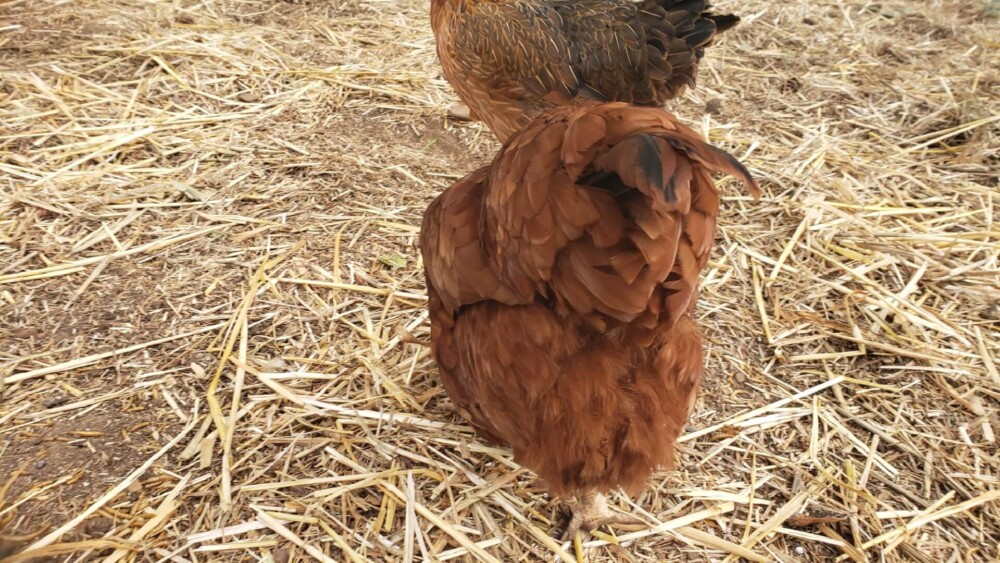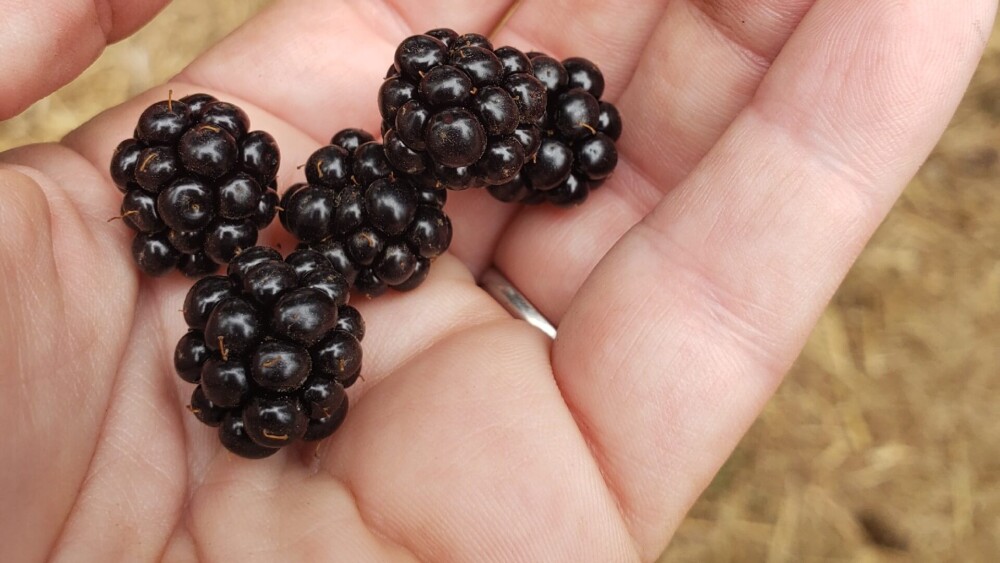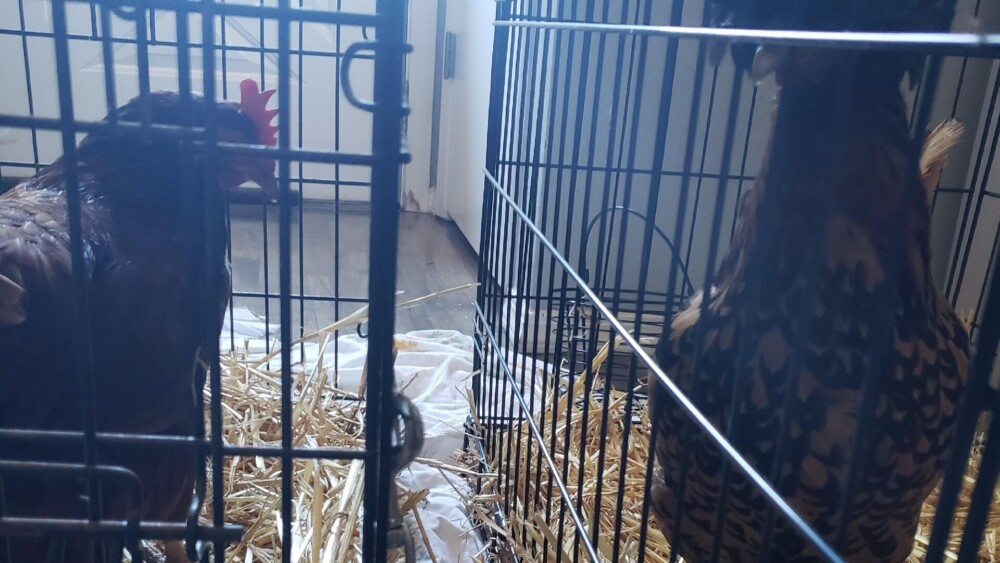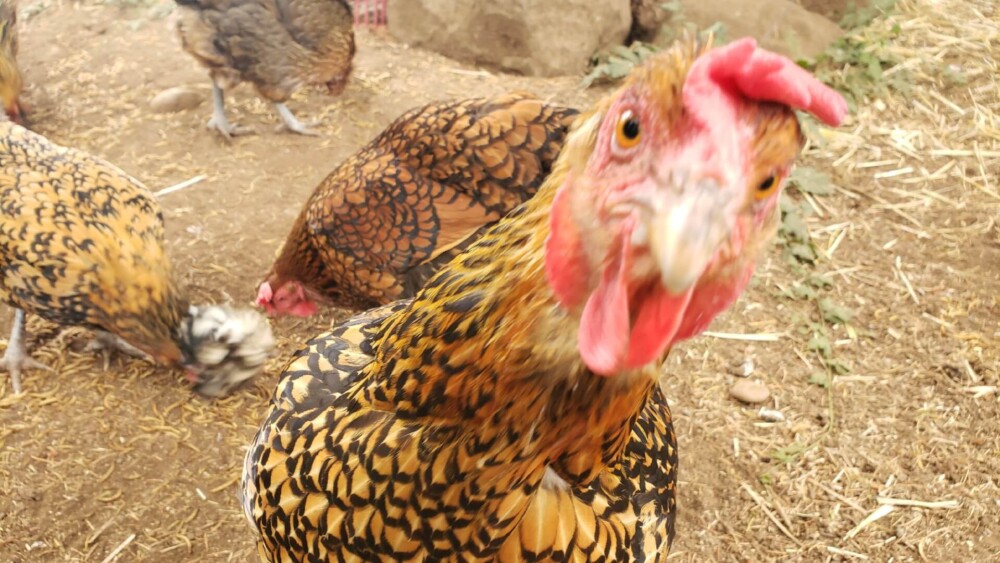As a new chicken keeper, there may be certain behaviors you’re simply not used to seeing when observing your flock. Chickens stick together most of the day, whether they’re preening, eating, scratching, or pecking at flowers.
However, when you watch closely, you’ll notice if a hen is acting off and not behaving the way she usually does throughout the day. This behavior is both subtle and sometimes glaringly obvious.
Why is my chicken acting weird? Typically strange chicken behavior is the result of stress, illness, or bullying among the flock. Signs of a sick or distressed chicken include lethargy, pale comb and wattles, hiding, a change in behavior, or a change in eating, egg dropping, or droppings.
8 Signs My Chicken Is Acting Weird (Is that ok?)
Once you get to know your chickens well you’ll recognize when a chicken is sick. Sometimes chickens are silly and they’re chasing a moth or roosting in a tree versus in a chicken coop. I’m going to cover the most common reasons chickens act odd and whether or not you should be concerned.
My two flocks are full of hilarious personalities but every once in a while I notice some weird behavior. Here’s what you should be looking for when your chicken is acting a little off.
- A Dirty Vent
- Unusually puffed up
- Sneezing
- Hiding (away from flock or you)
- Breathing Struggles
- Roosting in a tree
- Difficulty Swallowing
- Restless at night
- Lethargic
1. Chicken Acts Lethargic
Instead of constant activity, strutting, and pecking, your hen stands so still, you’ve started to worry. Her movement is slow and she doesn’t seem interested in exploration. If your chicken is acting lethargic and disinterested in its surroundings, check for other accompanying signs.
First, check for a fluffy butt on your hens. Second, check for dirt, debris, or a yellow discharge on the feathers of your chicken. Those are clear signs you may have a sick chicken.
If the vent area looks dirty and your chicken isn’t pecking and scratching around like normal, it’s likely vent gleet. Vent gleet is a fungal yeast infection that attacks the rump. It happens when the bad bacteria overwhelms the good bacteria in a chicken’s digestive tract and is basically a chicken’s version of a yeast infection.
You may need to add a probiotic to their feed. Your chicken’s digestive tract may be off due to stress or even excessive heat. Anytime a chicken is having digestive issues she will be lethargic and may not move around much.
2. Puffy Chicken
A puffed-up chicken can mean two things, and neither is good news. First, your hen may be broody or not feeling well. If the temperature is cool, your chicken may be trying to keep their body warm. You’ll likely see the flock huddled all together.
Puffing their feathers out actually traps air in their feathers and keeps them warm. It acts as insulation. Chicken keepers need to watch this behavior and if the weather isn’t cold enough to warrant this, your chicken may be feeling under the weather.
Cold weather is a normal situation for a puffy hen. A broody hen will not leave her nest, except to quickly eat or drink. If your hen is wandering around during warm weather and is puffed up- something is likely wrong.

3. Chicken Is Sneezing
If your chicken is sneezing, she has probably caught a respiratory disease or is reacting to excessive dust. Watch your flock to see if the sneezing is a random sneeze or if it continues.
Respiratory illness might include bronchitis, CRD, or Coryza.
Chickens can get sick from extreme wet or cold conditions and start sneezing. Healthy chickens might start sneezing during particularly dusty periods, such as after their coop has been cleaned out. Because chickens are sensitive to breathing issues, you must address all reasons causing your hens to sneeze.

4. Hiding Hen
Your chicken isn’t behaving normally. You may notice that your hen has started hiding behind bushes or in the corner of the coop instead of ranging outside. Perhaps you can’t find one of your chickens. Or, when you do, she’s acting strangely. There is a reason for this behavior.
Your chicken may be sick and trying to stay out of the way. Chickens naturally pick on weak or injured chickens. So, hiding is often a defensive instinct that protects a sick chicken from further stress.
Or, she might be being bullied by another chicken at the top of the pecking order. (Find out How to stop bullying) Either way, isolate her from the other chickens and get a good look at her to make sure there isn’t an injury. Give her some space and quiet to lower her stress levels.
5. Chicken Is Having Trouble Breathing
Chickens are very prone to breathing issues. If you notice one of your chickens is breathing heavily or appears to be gasping for air, examine her and feel her crop.
Check to see if it feels full or hard. If it’s empty it’s important to look for other signs of illness such as runny eyes or a nasal discharge. Make sure that you, or your neighbors, haven’t sprayed pesticides around your chickens.
Check to make sure the chicken feed isn’t moldy. Even seemingly harmless mold can be deadly to them. Check the coop for signs of mold or fungus. If the coop doesn’t have adequate ventilation, it will be humid and ripe for bacteria, mold, and viruses that can harm your flock.
Respiratory issues can be very serious so isolate the hen right away to avoid spreading the illness and do a full exam
6. Hen Is Roosting In a Tree
Some chickens prefer to roost in a tree. This may seem strange, but it comes from millennia ago when chickens were wild. It’s a protective instinct.
Check your coop size. Chickens need 3-4 feet per chicken inside a coop and more in a chicken run. There should be plenty of roosting spots off the ground. If you have adequate accommodations for your hens, then take a good look at the birds to ensure they’re not bullying each other and knocking each other off tree branches!
You can retrain them to gather at the coop in the evenings by feeding them in the coop so they gather and locking them in at night. This helps with predator protection as well.

7. Hen Cannot Swallow
You notice your chicken isn’t able to swallow when eating the treats you throw out. I allow my birds to free-range and this allows them to eat berries, nuts, and herbs. I’ve never had an issue. None of our chickens have issues swallowing.
But, if you let your chickens forage, you should know what’s out in the pasture. Look for anything that may be toxic. Watch for poisonous plants or flowers your chicken could get sick from eating. If your chicken is having an issue swallowing, it may be due to something in the environment.
8. Restless Chicken at Night
Another thing to consider is mites. You can only see parasites at night typically so get a headlamp and look to see if the chickens are bothered at night by these nasty bugs. A bad infestation of any type of mite, lice, or parasites may kill your chicken. This may not happen right away but if your birds are bothered when they’re roosting you need to treat them with medication or a product like an elector PSP. Always follow the instructions on the bottle.
9. Lethargic Chicken
If your chickens seem lethargic, then it’s almost always a sign of illness. Check for other signs including external injury. Listen to its breathing. Feel the crop. Isolate your chicken and watch to see if her droppings are different or not. Check for signs of mites and other parasites.
There are many things that can cause a lethargic or listless chicken. Isolating her allows you to control a few factors such as what she’s eating and drinking. You may be able to identify if she’s sick from illness or from consuming something that is harming her.
It’s a good idea to provide probiotics, electrolytes, and a little apple cider vinegar. These won’t hurt your hen and can make it easier for her natural defenses to beat an illness. If you see signs of mites or parasites, food-grade diatomaceous earth can help you combat it.
Symptoms Of A Sick Chicken
If your chickens are sick or acting weird, it is best to move them to a makeshift hospital. This can consist of dog crates. Watch for these typical symptoms of a sick chicken:
-
- Losing weight: Does your hen look skinny? Perhaps you’ve noticed she hasn’t been eating with the others.
- Dirty feathers and vent: A dirty vent may be a yeast infection. A probiotic may help.
- Swollen or puffy: When a chicken is lethargic and puffed out this may be the result of colder temperatures but can also mean she’s feeling under the weather.
- Panting: Open-mouth breathing is not normal and hot temperatures may cause your flock to pant.
- Watery eyes: Always look for swollen or foamy eyes, a discharge from the eyes, or cloudy eyes.
- Runny nose: You may see a discharge from the nose or crusty and scabby nostrils.
- Coughing: Your hens may experience labored breathing, panting, or coughing.
- Head shaking: Is your chicken constantly shaking their head? Respiratory disease may cause your hen to shake her head.
- Diarrhea: Diarrhea may happen when a hen is stressed or ill. So if you see diarrhea in the coop under roost bars, it’s important to start watching to see if you can narrow down which chicken has GI upset.
- Listless: A listless chicken is a sick chicken. Try to find out why as early as possible so you can treat it.

How to Care For A Sick Chicken
Regardless of what is ailing your hen, isolate sick chickens. You want to reduce the stress on your hen and reduce the likelihood of infection to the rest of your flock.
She’ll be easier to handle and less stressed when she’s alone and in a small area where you can closely examine her to see if there are additional signs of an illness.
Conclusion
A savvy chicken keeper knows that you are going to need to care for sick hens at some point. Always assume that any strange behavior could mean your chicken is under the weather. Unfortunately, by the time your chicken is acting sick they’ve been ill for a while. Chickens are very good at hiding any type of illness and this goes for roosters too.
My Favorite Chicken and Duck Supplies
This list contains affiliate products. Affiliate products do not cost more but helps to support BestFarmAnimals and our goal to provide farm animal owners with accurate and helpful information.
Manna Pro Oyster Shell keeps eggs strong. Before I gave my chickens oyster shell, I had the oddest eggs, many with weak and irregular shells. Now, I don’t have an issue.
Layer Feed by Manna Pro. I like pellets rather than crumbles as my chickens eat them better and less gets wasted or scavenged by rodents. A good layer feed makes the difference in hens laying many more eggs.
My chickens love this mealworm treat, which gives added protein, something that’s great during molting and winter months.
There are many ways to feed and water your chickens. I like this food and water setup the best because it reduces waste, saves me time feeding and watering, and keeps the food fresh longer. Except, in the winter, I use a heated waterer. The only problem is the heated waterers need to be replaced every few years.
I love this chicken veggie hanger. It makes it easy to give your chickens produce from the garden and keep them occupied in the winter with a fresh head of lettuce.
These chicken toys are a hoot! They will help curb bullying and keep your chickens active, especially in the winter when hens tend to get more lethargic.

